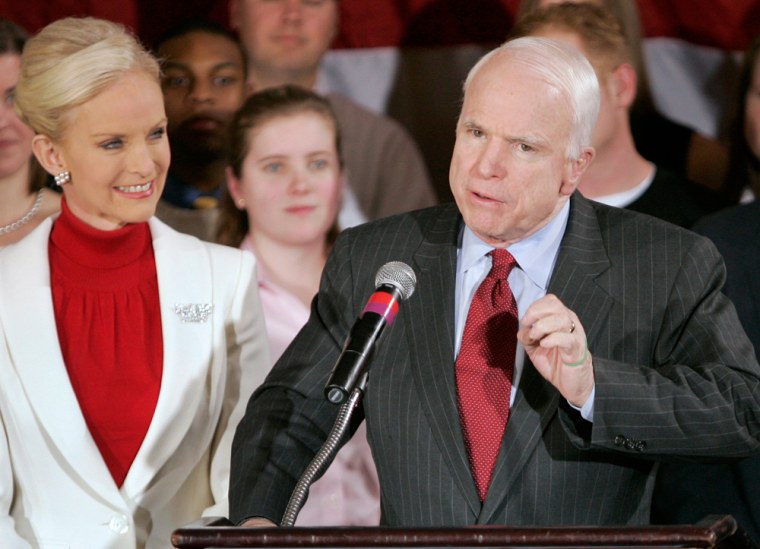The pressure's on for Republicans to show staying power in a presidential primary race where, as Fred Thompson put it Wednesday, "everyone gets to be hero of the day."
After three major contests with three different winners, Republicans are deep in an anything-goes scramble for South Carolina's primary Saturday, with Mitt Romney the latest to take a victory lap. "I'm not making predictions about what's going to happen in every other state, but I'm feeling pretty darn good at this point," he said, coming off of a much-needed win in his native Michigan.
Thompson hopes it's his turn to be a hero.
"There's no question we've got to do very well here," said the former Tennessee senator, who fizzled in earlier states. "Different people are winning these different major contests and I think a different person will win Saturday in South Carolina. No one has settled in on anyone."
The same was true, with a smaller cast, in the Democratic race. Democrats competed for Nevada's caucuses, also Saturday, after a toned-down TV debate in which top rivals Hillary Rodham Clinton and Barack Obama pledged to tamp down arguments between their camps over race.
Romney said the Michigan primary Tuesday "gave me the kind of boost I needed." Anything short of victory would have left his campaign on the ropes, after his losses to Mike Huckabee in Iowa and John McCain in New Hampshire.
Thompson, in a pitched competition with Huckabee for the evangelical vote in South Carolina, said he's the one with consistent social conservative credentials. Of the former Arkansas governor's record, "liberal would be the word I would apply to it," he said. And he pointed to Romney's policy conversions to the right in saying of himself, "Where I stand doesn't depend on where I'm standing."
Huckabee said it's "ludicrous" to think he's liberal and pointed out he favors a constitutional amendment to ban gay marriage, and Thompson doesn't.
"The writers strike needs to end soon," Huckabee said with mock concern about Thompson's rhetoric. "He's got to come up with some good lines. And that's not one of them that's going to be credible."
Huckabee discounted Romney's business experience as an asset in a time of great economic worry. He said his record of creating jobs and cutting deficits in Arkansas counts for more.
"You know, that's what people are looking for: Can you steer the canoe through low water?" he said.
McCain predicted he would prevail this time in South Carolina, the state that derailed his candidacy eight years ago.
Out of Michigan before the polls closed, McCain told South Carolina supporters: "For a minute there in New Hampshire, I thought this campaign might be getting easier. But you know what? We've gotten pretty good at doing things the hard way, too. I think we've shown them we don't mind a fight."
The Arizona senator emphasized Romney's ties to Michigan. He grew up there and his father, George, was an auto company executive and a popular governor.
"Michigan welcomed their native son with their support," McCain said.
Indeed, interviews with voters as they left polling stations indicated Romney's roots mattered to many of them - four in 10 said those ties were important in how they voted. That's of no help in states coming next.

But the tea leaves were also troubling for McCain, who was powered to victory in New Hampshire largely by independents and has yet to show he can rally the Republican base behind him. Michigan exit polls suggested McCain only got about a quarter of votes cast by Republicans in a state where citizens could participate in either party's primary.
In Michigan, Romney had 39 percent of the vote, McCain had 30 percent and Huckabee 16 percent. No other Republican fared better than single digits.
McCain won the New Hampshire primary in 2000 only to see his campaign run into a wall in South Carolina, where George W. Bush emerged victorious and went on to wrap up the GOP nomination.
The top Democratic candidates — Clinton, Obama and former North Carolina Sen. John Edwards — were locked in a tight battle in Nevada. All three were campaigning in the state.
In their debate on Tuesday night, Clinton and Obama sought to defuse their flash-point over race, including comments by the former first lady on President Lyndon Johnson's role in winning approval of civil rights legislation in the 1960s, comments that some of Obama's backers suggested belittled the role of Martin Luther King Jr.
They jointly pledged on the slain civil rights leader's birthday to put the matter behind them. Obama is seeking to become the nation's first black president.
Clinton won the Democratic primary in Michigan, but her victory was essentially meaningless since the contest was held in violation of party rules and major Democratic candidates did not campaign there.
On the Democratic side, Obama won the kickoff Iowa caucuses but Clinton came back with a narrow victory in the New Hampshire primary, defying polls.
After the Saturday caucuses for both parties in Nevada and the GOP primary in South Carolina, attention turns to the Democratic primary in South Carolina on Jan. 26 and then the Florida primary on Jan. 29, where Rudy Giuliani hopes to spring into the race as a top GOP contender.
The former New York mayor got only 3 percent of the Michigan vote, trailing Thompson and Texas Rep. Ron Paul as well as the top three, and he hasn't fared better than fourth in any of the states so far.
After that, come the Feb. 5 Super Tuesday contests in 22 states.
Romney spoke on the CBS "Early Show," NBC's "Today Show" and ABC's "Good Morning America." Thompson spoke on CNN and Huckabee on Fox.